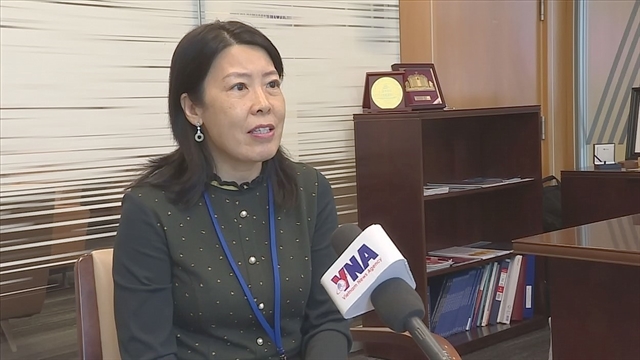 Politics & Law
Politics & Law

 |
| Director of the UN Office on Drugs and Crime (UNODC) New York Liaison Office Xiaohong Li. — VNA/VNS Photo Hoài Thanh |
NEW YORK — Xiaohong Li, Director of the UN Office on Drugs and Crime (UNODC) New York Liaison Office, highlighted the UN Convention against Cybercrime's significance and Việt Nam's role in advancing global cooperation against cyber threats on the occasion of the opening for the signature of the convention in Hà Nội from October 25–26.
Speaking to Vietnam News Agency correspondents in New York, Li said the rapid development of information and communication technologies in recent years has transformed societies, improved governance, and promoted sustainable development.
However, it has also given rise to new forms of transnational crime. According to a recent UNODC report, East Asia and Southeast Asia witnessed a sharp rise in cybercrime from 2021 to 2024, causing estimated losses of more than US$37 billion. This, she stressed, underscores the urgent need for a global response to a global threat.
Against this backdrop, the adoption of the UN convention marks a historic milestone, the first non-criminal convention related to cyberspace governance. The convention provides a comprehensive, multidisciplinary framework to prevent and combat cybercrime, harmonising national laws on issues such as online fraud and establishing stronger mechanisms for law enforcement cooperation.
Regarding the collection and storage of electronic data, she said, the convention provides mechanisms and measures to promote international cooperation, including multilateral support for storing, collecting, and sharing electronic data, as well as extradition.
Notably, it establishes a 24/7 hotline, enabling stakeholders to respond more swiftly to cross-border and emergency cases. In addition, it lays the groundwork for comprehensive cybercrime prevention measures aimed at tackling the root causes of such crimes, strengthening technical cooperation, and building capacity to narrow the technological gap between countries.
She noted that the convention aims to protect human rights through robust legal tools. Li expressed confidence that once in effect, the document will serve as an effective, comprehensive global legal framework for tackling cybercrime.
Speaking of Việt Nam’s role in the convention building and adoption, the UNODC official praised the country’s hosting the signing ceremony, calling it a landmark event that demonstrates Việt Nam’s commitment to collective action against global threats. She said over the five years of negotiations, Việt Nam acted as a bridge-builder, helping to narrow differences among UN member states.
The UN’s decision to select Hà Nội as the venue sends a strong message of multilateralism in action, Li noted. It reflects Việt Nam’s growing international prestige as a responsible, constructive and reliable partner within the UN and the global community.
The upcoming Hà Nội ceremony, she added, carries even greater significance as Asia is now among the regions most affected by cybercrime. Li expressed confidence that Việt Nam will continue to play an active role in convention implementation.
Looking ahead, Li said that after the Hà Nội event, the UN will continue with the signing process at its headquarters in New York or another designated venue. Member states will then proceed with national ratification within 90 days. The convention will enter into force once at least 40 countries complete the ratification process.
During this phase, UNODC will continue to assist member states through legal and strategic advisory support, digital forensics training, and international cooperation programmes. It will also serve as secretary for future meetings of the convention’s parties, with the first session scheduled for January 2026 in Vienna, Austria, to discuss procedural rules and cooperation mechanisms. — VNA/VNS




